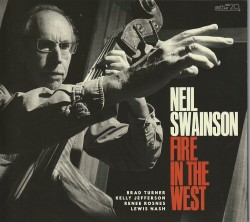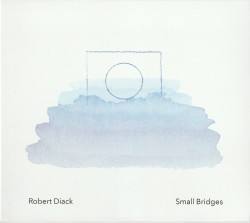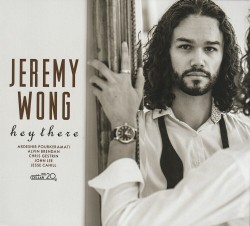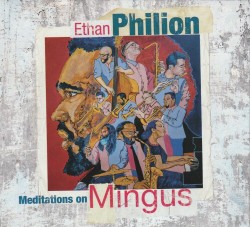A Rodney Dangerfield in most musical configurations, the double bass doesn’t get much respect since its workhorse qualities are used for accompaniment rather than upfront. That changed in the 20th century, especially in jazz, and then more prominently in improvised music. Innovators such as the UK’s Barry Guy, France’s Joëlle Léandre and American Barre Phillips all recorded notable solo bass discs in the 1970s and 1980s and since then many others bassists have tried their hand(s) at the challenge. What follows are a few recent examples.
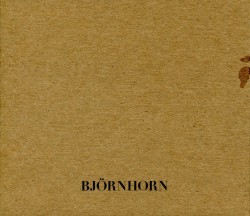 Concentrating on the bow, Sweden’s Johan Berthling, known for his Fire! trio with Mats Gustafsson, scratches and slices pitches and thumps from his instrument’s strings and wood on Björnhorn (Thanatosis Productions THT 12 thanatosis.org). Often sul tasto and frequently spiccato, his strained low pitches and scrappy mid-string forays frequently work up to near bagpipe-like tremolos. As on Björnhorn III, resolution is usually projected with stentorian drones. His clenched hand-on-bass-neck techniques concentrate most billowing buzzes into a solid mass, yet on Björnhorn V he spackles high-pitched colours to lighten the narrative. While the presto and staccato friction projected by his bow work sometimes suggests the strings are a millisecond away from literally bursting into flames, his one turn to pizzicato thumps out wide spatial suggestions. Furthermore when he assays Charlie Haden’s balladic For Turiya, his buoyant vibrations show he’s also capable of melodic storytelling.
Concentrating on the bow, Sweden’s Johan Berthling, known for his Fire! trio with Mats Gustafsson, scratches and slices pitches and thumps from his instrument’s strings and wood on Björnhorn (Thanatosis Productions THT 12 thanatosis.org). Often sul tasto and frequently spiccato, his strained low pitches and scrappy mid-string forays frequently work up to near bagpipe-like tremolos. As on Björnhorn III, resolution is usually projected with stentorian drones. His clenched hand-on-bass-neck techniques concentrate most billowing buzzes into a solid mass, yet on Björnhorn V he spackles high-pitched colours to lighten the narrative. While the presto and staccato friction projected by his bow work sometimes suggests the strings are a millisecond away from literally bursting into flames, his one turn to pizzicato thumps out wide spatial suggestions. Furthermore when he assays Charlie Haden’s balladic For Turiya, his buoyant vibrations show he’s also capable of melodic storytelling.
 If there are so many notes and tones in Berthling’s solos to almost make them feel cramped then Swiss bassist Daniel Studer takes the opposite approach on Fetzen Fliegen (Wide Ear Records WER 064 wideearrecords.ch). Recorded from various points in an anechoic chamber, Studer, who besides working with many groups, teaches improvisation at Bern University, uses this spatial situation to layer his sounds with as many extended silences as pressurized string trembles and swells. Making a virtue out of slowness, hard string thumps, clanking arco variations and the scraping friction which introduces the final two variations of four are magnified even more to contrast with the silent interludes. But the session is more than singular arco slices or frog-against-string accents. Cumulative friction at the end of Fetzen Fliegen 2 is so thick that jet plane engine noises are suggested before the tone thins to bow strokes. With col legno slides, Studer at junctures also creates responsive echoes between that technique and throbbing string plinks. Managing to nearly replicate recorder-like whistles with spindly stings and drum-like rumbles, his brief pivots into metallic discord only add to the expositions. Emphasizing sound shards among the quiet, Studer offers a unique definition of all that a double bass can do at a slow, anything but easygoing, pace.
If there are so many notes and tones in Berthling’s solos to almost make them feel cramped then Swiss bassist Daniel Studer takes the opposite approach on Fetzen Fliegen (Wide Ear Records WER 064 wideearrecords.ch). Recorded from various points in an anechoic chamber, Studer, who besides working with many groups, teaches improvisation at Bern University, uses this spatial situation to layer his sounds with as many extended silences as pressurized string trembles and swells. Making a virtue out of slowness, hard string thumps, clanking arco variations and the scraping friction which introduces the final two variations of four are magnified even more to contrast with the silent interludes. But the session is more than singular arco slices or frog-against-string accents. Cumulative friction at the end of Fetzen Fliegen 2 is so thick that jet plane engine noises are suggested before the tone thins to bow strokes. With col legno slides, Studer at junctures also creates responsive echoes between that technique and throbbing string plinks. Managing to nearly replicate recorder-like whistles with spindly stings and drum-like rumbles, his brief pivots into metallic discord only add to the expositions. Emphasizing sound shards among the quiet, Studer offers a unique definition of all that a double bass can do at a slow, anything but easygoing, pace.
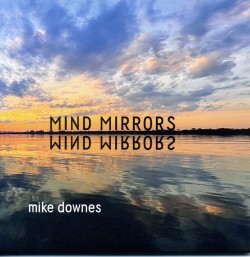 For a complete change of pace though, there’s Mind Mirrors (MMusic mikedownes.com) by veteran Toronto bassist Mike Downes. Perhaps it’s because he’s Canadian, the multiple Juno Award winner has created 11 solos, which are tasteful and somewhat gentle, but without ever letting go of the underlying beat. Still, who else but a Canuck would title the folksy, but powerful variations on one track Campfire Waltz? He’s also the only bassist here to play a standard, I Fall in Love Too Easily. Yet he’s crafty enough to avoid familiarity by offering up balanced variations on it before subtly revealing the melody. Crucially though, Downes is adventurous enough to mate field recordings of crackling thunder with the dynamic modifications from the triple stopping and reflecting tones of a Yamaha SLB200 hollow-body electric bass on Thunder. He sticks to the regular double bass on the other tracks, showing his arco and pizzicato skills. In fact on Morning Sun Ringing he alternates plucking slippery vibrations from the instrument’s strings and wooden body, while at the same time creating a warm connection with measured arco triple stops. Some pieces are foot tappers, as he modulates up and down the strings with rumbling bow work. Elsewhere he preserves the rhythm impetus on a track like Alone or Together with lighter strokes that take on flamenco colourations and darker ones which suggest Charles Mingus-like soulfulness.
For a complete change of pace though, there’s Mind Mirrors (MMusic mikedownes.com) by veteran Toronto bassist Mike Downes. Perhaps it’s because he’s Canadian, the multiple Juno Award winner has created 11 solos, which are tasteful and somewhat gentle, but without ever letting go of the underlying beat. Still, who else but a Canuck would title the folksy, but powerful variations on one track Campfire Waltz? He’s also the only bassist here to play a standard, I Fall in Love Too Easily. Yet he’s crafty enough to avoid familiarity by offering up balanced variations on it before subtly revealing the melody. Crucially though, Downes is adventurous enough to mate field recordings of crackling thunder with the dynamic modifications from the triple stopping and reflecting tones of a Yamaha SLB200 hollow-body electric bass on Thunder. He sticks to the regular double bass on the other tracks, showing his arco and pizzicato skills. In fact on Morning Sun Ringing he alternates plucking slippery vibrations from the instrument’s strings and wooden body, while at the same time creating a warm connection with measured arco triple stops. Some pieces are foot tappers, as he modulates up and down the strings with rumbling bow work. Elsewhere he preserves the rhythm impetus on a track like Alone or Together with lighter strokes that take on flamenco colourations and darker ones which suggest Charles Mingus-like soulfulness.
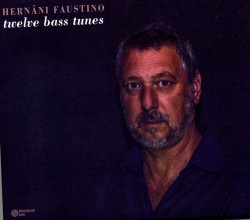 Someone who evolved from playing electric bass in rock bands to creative music with the likes of Carlos Zingaro is Portuguese bassist Hernâni Faustino. His work is characterized by a deep dark tone which he displays throughout Twelve Bass Tunes (Phonogram Unit PU 5 CD phonogramunit.com). While the percussiveness and power he lays out link him to jazz stylists like Mingus and Ray Brown, his upper register echoes and col legno vibrations and recoils show that he’s firmly attuned to 21st-century improv. In fact, the first sound on Sequência, the CD’s opening track, is a buried bomb-shelter thick strum. But soon powerful string pulls give way to an agile up-and-down theme projected with guillotine-sharp slices before returning to squeaky friction. This orthodox-offbeat dichotomy plays out during most of the other 11 bagatelles with some tracks as melodious as if they were being vocalized by an operatic basso and others dedicated to string experiments. While rappelling along the string set on a track like Tríptico da Virgem de Lamego for instance, Faustino extends his multiphonic expression with thrusts that sound as if he’s also digging into the instrument’s wooden body. He can also double and triple string stop at the same time as he speeds up the exposition as on Co’ Os Olhos deepening and darkening them as it evolves. At lento and adagio tempos he can outline the timbre of each string as he touches it as on Pertença do Gato Grande, yet subtly elevate to reverberating andante lines before the conclusion. Even a rare move to arco playing on Serra das Meadas mates expressive melancholy with torqued pressure as he emphasizes bridge-centred tones. Concurrently nearly every note sounded comes out balanced and well-rounded as his multi-string and atmospheric asides are firmly grounded with straight-ahead and carefully measured plucks.
Someone who evolved from playing electric bass in rock bands to creative music with the likes of Carlos Zingaro is Portuguese bassist Hernâni Faustino. His work is characterized by a deep dark tone which he displays throughout Twelve Bass Tunes (Phonogram Unit PU 5 CD phonogramunit.com). While the percussiveness and power he lays out link him to jazz stylists like Mingus and Ray Brown, his upper register echoes and col legno vibrations and recoils show that he’s firmly attuned to 21st-century improv. In fact, the first sound on Sequência, the CD’s opening track, is a buried bomb-shelter thick strum. But soon powerful string pulls give way to an agile up-and-down theme projected with guillotine-sharp slices before returning to squeaky friction. This orthodox-offbeat dichotomy plays out during most of the other 11 bagatelles with some tracks as melodious as if they were being vocalized by an operatic basso and others dedicated to string experiments. While rappelling along the string set on a track like Tríptico da Virgem de Lamego for instance, Faustino extends his multiphonic expression with thrusts that sound as if he’s also digging into the instrument’s wooden body. He can also double and triple string stop at the same time as he speeds up the exposition as on Co’ Os Olhos deepening and darkening them as it evolves. At lento and adagio tempos he can outline the timbre of each string as he touches it as on Pertença do Gato Grande, yet subtly elevate to reverberating andante lines before the conclusion. Even a rare move to arco playing on Serra das Meadas mates expressive melancholy with torqued pressure as he emphasizes bridge-centred tones. Concurrently nearly every note sounded comes out balanced and well-rounded as his multi-string and atmospheric asides are firmly grounded with straight-ahead and carefully measured plucks.
 Concentrating on arco invention, fellow Portuguese bassist João Madeira cycles through all manner of burly drones on the two extended instant compositions which make up Aqui, Dentro (Miso Music MCD 49 22 misomusic.me). Lisbon-based Madeira, who is part of other free jazz configurations, including a double bass duo with Faustino, concentrates on using sul ponticello and sul tasto slices to extrude a chunky interface that’s almost impenetrable. Nearly, but not completely. For among the reoccurring drones, tone gradations can also be heard. At points, elevated shrieks are heard, as if he’s cutting into the instrument’s wood as well as stroking the strings. At times, these high-pitched motifs take on viscous bassoon-like suggestion or bagpipe-like hums. Emphasizing ripples across the strings as tempos shift from lento to allegro, the heavy drones even maintain their shape elsewhere when Madeira’s progress ascends to allegrissimo and prestissimo. Often, emphasized passages are repeated so frequently in sequence that you begin to fear there’s a recording fault, until he exposes new singular textures that he buzzes to a resolution. Moving into the second selection, simultaneous warm vibrating plucks and knife-sharp strokes display his facility with both techniques. As intermittent frails move to the foreground so does a touch of melody. But the key to Aqui, Dentro is how nearly oppressive bulk can be made to express polychromatic tones with an inventive strategy.
Concentrating on arco invention, fellow Portuguese bassist João Madeira cycles through all manner of burly drones on the two extended instant compositions which make up Aqui, Dentro (Miso Music MCD 49 22 misomusic.me). Lisbon-based Madeira, who is part of other free jazz configurations, including a double bass duo with Faustino, concentrates on using sul ponticello and sul tasto slices to extrude a chunky interface that’s almost impenetrable. Nearly, but not completely. For among the reoccurring drones, tone gradations can also be heard. At points, elevated shrieks are heard, as if he’s cutting into the instrument’s wood as well as stroking the strings. At times, these high-pitched motifs take on viscous bassoon-like suggestion or bagpipe-like hums. Emphasizing ripples across the strings as tempos shift from lento to allegro, the heavy drones even maintain their shape elsewhere when Madeira’s progress ascends to allegrissimo and prestissimo. Often, emphasized passages are repeated so frequently in sequence that you begin to fear there’s a recording fault, until he exposes new singular textures that he buzzes to a resolution. Moving into the second selection, simultaneous warm vibrating plucks and knife-sharp strokes display his facility with both techniques. As intermittent frails move to the foreground so does a touch of melody. But the key to Aqui, Dentro is how nearly oppressive bulk can be made to express polychromatic tones with an inventive strategy.
Each player here has designed a solo double bass procedure that goes far beyond expected approaches. As time evolves, it’s certain that even more novel strategies for the bulky instrument will be discovered.
 Emerald City Nights: Live at The Penthouse 1963-64
Emerald City Nights: Live at The Penthouse 1963-64 These two 2CD sets come from 1960s performances at the Penthouse, a prominent Seattle jazz club of the period at which Jamal performed frequently. Originally recorded for radio broadcasts, the sound is excellent, with each set covering appearances over a two-year period. Jamal is joined by a series of rhythm section pairings, including bassists Richard Evans and Jamil Nasser and drummers Chuck Lampkin and Vernel Fournier, each team forming a vital partnership in executing Jamal’s complex extrapolations, combining detailed arrangements and fluid improvisations. Works here often develop at length, including a crystalline version of Jamal’s own Minor Moods and a virtuosic I Didn’t Know What Time It Was, one approaching the quarter-hour mark, the other exceeding it, but there are no empty segments, each one a model of focused musicality. The contemporary Feeling Good, a hit for Nina Simone, sounds like it was written for Jamal. Meanwhile, Jamal’s art is also an allusive one, whether he’s inserting Nat Adderley’s Work Song into that Bricusse-Newley pop hit or Charlie Parker’s Now’s the Time into Cole Porter’s All of You.
These two 2CD sets come from 1960s performances at the Penthouse, a prominent Seattle jazz club of the period at which Jamal performed frequently. Originally recorded for radio broadcasts, the sound is excellent, with each set covering appearances over a two-year period. Jamal is joined by a series of rhythm section pairings, including bassists Richard Evans and Jamil Nasser and drummers Chuck Lampkin and Vernel Fournier, each team forming a vital partnership in executing Jamal’s complex extrapolations, combining detailed arrangements and fluid improvisations. Works here often develop at length, including a crystalline version of Jamal’s own Minor Moods and a virtuosic I Didn’t Know What Time It Was, one approaching the quarter-hour mark, the other exceeding it, but there are no empty segments, each one a model of focused musicality. The contemporary Feeling Good, a hit for Nina Simone, sounds like it was written for Jamal. Meanwhile, Jamal’s art is also an allusive one, whether he’s inserting Nat Adderley’s Work Song into that Bricusse-Newley pop hit or Charlie Parker’s Now’s the Time into Cole Porter’s All of You. 






